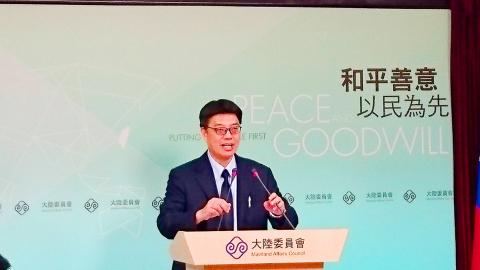The Legislative Yuan is to prioritize review of proposed amendments to four laws during its next session to strengthen Taiwan’s “democracy defense mechanism,” Mainland Affairs Council (MAC) Deputy Minister Chiu Chui-cheng (邱垂正) said yesterday, after reports that more than 20 Taiwanese online media outlets shared an article criticizing President Tsai Ing-wen (蔡英文) that had been published by a Web site managed by China’s Taiwan Affairs Office.
The “China Taiwan Site” on Tuesday published an article by a reader saying that given how the Tsai administration had “removed” National Taiwan University (NTU) president-elect Kuan Chung-ming (管中閔) in such a “poor” and “overbearing” manner, the public would easily remove Tsai next year to end the Democratic Progressive Party’s (DPP) foolish behavior.
The article was republished by Fingermedia (指傳媒), Asia Media (亞傳媒) and Taiwan Diginews (民生報導), among other local outlets.

Photo: Chung Li-hua, Taipei Times
China has been using “sharp power” in the past few years to infiltrate and divide democratic societies, while the US, Australia and other nations have drafted anti-infiltration and anti-foreign agent laws, among others, in a bid to resist infiltration and division by foreign forces, Chiu said.
After Chinese President Xi Jinping (習近平) proposed his “five points” in January, the strength of China’s “united front” and infiltration efforts toward Taiwan have been increased, he said.
Taiwan’s democratic, free and open society has been used to confuse and divide the public and destroy the nation’s political order, he added.
As Taiwan is on the front lines facing the threat of China’s “sharp power,” to respond to China’s new “united front” tactics aimed at “eliminating Taiwan,” there is a “legitimate and necessary” rationale to push for laws and regulations that would bar Chinese Communist Party (CCP) agents and related activities, he said.
The Lobbying Act (遊說法), the Political Donations Act (政治獻金法) and the Civil Servants Election and Recall Act (公職人員選舉罷免法) prohibit China from engaging in such activities, but there are no laws regulating such illegal activities performed through “agents,” he said.
The DPP caucus has proposed amendments to the Act Governing Relations Between the People of the Taiwan Area and the Mainland Area (臺灣地區與大陸地區人民關係條例) to address the issue of CCP agents.
The New Power Party’s legislative caucus and others have also proposed draft amendments to address foreign infiltration.
Among the laws targeted for amendment are the Radio and Television Act (廣播電視法), the Cable Radio and Television Act (有線廣播電視法) and the Satellite Broadcasting Act (衛星廣播電視法), Chiu said.
The council would cooperate with the DPP’s proposed amendments, and it would also support incorporating covering foreign agents into other laws, he added.
The Executive Yuan and the Legislative Yuan would work together to push for legal, constitutional and feasible bills, he said.
As part of the process of drafting proposed amendments, the government would listen to the opinions of academics, experts and other members of society to ensure the normal functioning of the nation’s free and democratic constitutional system and its social economy; defend national sovereignty and security; and protect the people’s basic rights.

Alain Robert, known as the "French Spider-Man," praised Alex Honnold as exceptionally well-prepared after the US climber completed a free solo ascent of Taipei 101 yesterday. Robert said Honnold's ascent of the 508m-tall skyscraper in just more than one-and-a-half hours without using safety ropes or equipment was a remarkable achievement. "This is my life," he said in an interview conducted in French, adding that he liked the feeling of being "on the edge of danger." The 63-year-old Frenchman climbed Taipei 101 using ropes in December 2004, taking about four hours to reach the top. On a one-to-10 scale of difficulty, Robert said Taipei 101

Nipah virus infection is to be officially listed as a category 5 notifiable infectious disease in Taiwan in March, while clinical treatment guidelines are being formulated, the Centers for Disease Control (CDC) said yesterday. With Nipah infections being reported in other countries and considering its relatively high fatality rate, the centers on Jan. 16 announced that it would be listed as a notifiable infectious disease to bolster the nation’s systematic early warning system and increase public awareness, the CDC said. Bangladesh reported four fatal cases last year in separate districts, with three linked to raw date palm sap consumption, CDC Epidemic Intelligence

Two Taiwanese prosecutors were questioned by Chinese security personnel at their hotel during a trip to China’s Henan Province this month, the Mainland Affairs Council (MAC) said yesterday. The officers had personal information on the prosecutors, including “when they were assigned to their posts, their work locations and job titles,” MAC Deputy Minister and spokesman Liang Wen-chieh (梁文傑) said. On top of asking about their agencies and positions, the officers also questioned the prosecutors about the Cross-Strait Joint Crime-Fighting and Judicial Mutual Assistance Agreement, a pact that serves as the framework for Taiwan-China cooperation on combating crime and providing judicial assistance, Liang

US climber Alex Honnold left Taiwan this morning a day after completing a free-solo ascent of Taipei 101, a feat that drew cheers from onlookers and gained widespread international attention. Honnold yesterday scaled the 101-story skyscraper without a rope or safety harness. The climb — the highest urban free-solo ascent ever attempted — took just more than 90 minutes and was streamed live on Netflix. It was covered by major international news outlets including CNN, the New York Times, the Guardian and the Wall Street Journal. As Honnold prepared to leave Taiwan today, he attracted a crowd when he and his wife, Sanni,